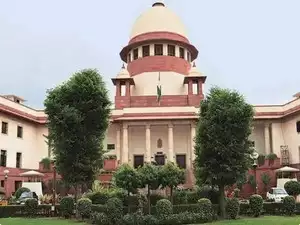


The Supreme Court has taken note of the remarks made by Allahabad High Court sitting judge Shekhar Kumar Yadav where he stated that the "country would function as per the wishes of the majority group." This statement was made by the judge while delivering a lecture on the 'Constitutional Necessity of Uniform Civil Code' at an event organized by the legal cell of the Vishva Hindu Parishad (VHP) in Prayagraj. The controversial remarks have sparked outrage and have raised questions about the impartiality of the judiciary.
Judge's Remarks on Majority Rule Spark Outrage
The Supreme Court has taken note of controversial remarks made by Allahabad High Court sitting judge Shekhar Kumar Yadav, who stated that "the country would function as per the wishes of the majority group." The statement was delivered during a lecture on the 'Constitutional Necessity of Uniform Civil Code' at an event organized by the legal cell of the Vishva Hindu Parishad (VHP) in Prayagraj.
Background
India's judiciary is renowned for its impartiality and independence. However, Judge Yadav's remarks have raised concerns about potential bias and a departure from the constitutional principles of secularism and equality. The Uniform Civil Code (UCC), which has been a topic of debate for decades, proposes to replace personal laws based on religion with a common set of laws for all citizens.
Outrage and Concerns
Judge Yadav's statement has drawn widespread criticism from lawyers, activists, and political leaders. They argue that his remarks violate the principle of judicial neutrality and could undermine public trust in the judiciary. The National Commission for Minorities has also expressed concerns, stating that such statements could promote discrimination and communalism.
Supreme Court's Response
The Supreme Court has taken cognizance of Judge Yadav's remarks and has reportedly sought his response. The court will examine the statement and determine whether it constitutes a violation of judicial ethics or warrants further action.
Top 5 FAQs and Answers
Q: What exactly did Judge Yadav say? A: He stated that "the country would function as per the wishes of the majority group."
Q: Why have his remarks sparked outrage? A: The statement is seen as a departure from the constitutional principles of secularism and equality, and as a potential threat to the impartiality of the judiciary.
Q: What is the Uniform Civil Code? A: It is a proposed set of laws that would replace personal laws based on religion with a common set of laws for all citizens.
Q: Has the Supreme Court taken any action? A: Yes, the court has taken cognizance of Judge Yadav's remarks and sought his response.
Q: What are the possible consequences for Judge Yadav? A: The Supreme Court may conduct an inquiry and determine whether his remarks violate judicial ethics or warrant further action, such as disciplinary proceedings.

The Pasighat police in East Siang district, Arunachal Pradesh have arrested the 33-year-old boys' hostel warden of Sanggo English School for sexually assaulting minor students. This came to light when a student was hospitalized for urogenital complications. The incident has sparked outrage from parents and the public, demanding strict action against the accused warden. In response, the Arunachal Pradesh State Human Rights Commission (APSHRC) has taken suo motu cognisance and ordered for a detailed report on the investigation, victim protection, and school management.

Actress Siddiqa Begum, daughter and legal heir of Shah Bano, has served a legal notice on the makers of the upcoming Bollywood film 'Haq'. The notice states that the film's unauthorized depiction of the personal life of Shah Bano without the consent of her legal heirs is a violation of their rights. 'Haq' is based on the landmark 1985 Supreme Court case that granted maintenance to Shah Bano, a Muslim woman, from her divorced husband.

After four years, the 'Darbar Move' tradition in Jammu and Kashmir has been restored, fulfilling the promise of the government and bringing a boost to the economy. National Conference chief Farooq Abdullah expressed happiness, noting that those who sought to separate Jammu and Srinagar have failed. Chief Minister Omar Abdullah received a warm reception and inspected the secretariat premises after the ceremony, as security in the region was heightened for the occasion.

Delhi Legislative Assembly Speaker Vijender Gupta praised Swami Dayanand Saraswati as not just a saint and reformer, but also a pivotal figure in India's freedom struggle. Speaking at the International Arya Samaj Conference, Gupta highlighted how Swami Dayanand's teachings sparked a revolution that led to the nation's independence. The event was attended by esteemed guests including Gujarat Governor Acharya Devvrat and top officials from the Arya Samaj community, all paying tribute to the enduring impact and legacy of Swami Dayanand Saraswati.

The Metro Railway Kolkata has announced a major schedule expansion for its Yellow Line, which runs between Noapara and Jai Hind Bimanbandar (Airport) in Kolkata. Starting from 3 November, weekday operations will increase to 120 services with extended operating hours, providing greater convenience and accessibility to commuters. Weekend travellers will also see a significant frequency upgrade, making travel on Saturdays and Sundays hassle-free. This move is expected to improve the overall public transportation system in the city and benefit the commuters.

Despite some reassurances that online verticals focused on diversity will continue, NBC News has announced a round of layoffs that will impact about 150 employees, or 2% of their workforce. The cuts are said to be a result of cost-cutting measures in preparation for the split of Comcast's cable networks into Versant. This move signifies a shift in priorities for NBC management, prioritizing corporate profits over hard-working members, according to Susan DeCarava, president of The NewsGuild of New York. This change also means that MSNBC will no longer lean on NBC News for newsgathering, with those ties expected to be severed next week.

The Kasibugga Venkateswara Temple in Srikakulam district was the site of a heart-wrenching stampede, causing multiple fatalities and affecting the community deeply. Chief Minister N. Chandrababu Naidu has expressed his sorrow over the unfortunate incident, as well as directing officials to ensure that those injured receive the best medical treatment possible. As local officials and public representatives are called to oversee relief operations, swift action is required to aid those affected and manage the situation effectively.

Indian Prime Minister Narendra Modi inaugurated the Shanti Shikhar Academy for Peaceful World in Raipur, praising the Brahma Kumaris organization for bridging India's ancient wisdom with the world's search for harmony. He credited the group's selfless service and spiritual discipline for their efforts towards universal peace. He positioned the Brahma Kumaris as protectors of India's soul and highlighted India's proactive role in addressing global crises such as disaster relief and environmental threats.

In an act of solidarity and protest, millions of Muslims in India used their Friday prayers to denounce the recent killings that took place in Pahalgam. The news comes amid growing tensions between the Muslim community and the Indian government. Many are viewing this as a sign of unity and determination from the Muslim population in India.

The state of Karnataka, or Kannada Rajyotsava, marked its 69th anniversary with a grand ceremony organized by the district administration in Mangaluru. District in-charge minister Dinesh Gundu Rao paid tribute to the leaders and writers who fought for a unified Kannada state and presented awards to 80 outstanding individuals and organizations. In his address, the minister highlighted the rich cultural and historical heritage of Karnataka and called for a sense of pride among its citizens.